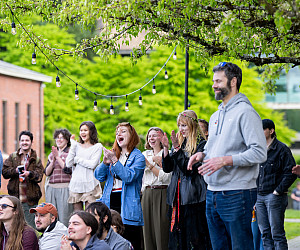main content Lewis & Clark to host first NEH-funded philosophy seminar


by Joey Carmichael, BA ’14
James F. Miller Professor of Humanities Nicholas D. Smith was awarded a National Endowment for the Humanities (NEH) grant to direct a five-week philosophy seminar at Lewis & Clark this summer.
It is extremely rare for an undergraduate-only institution to host these seminars, and Lewis & Clark has never before had the honor. The seminar will study “the historical person, and also the character in Plato’s dialogues, by the name of Socrates,” Smith said. “Those can be a little bit hard to sort out.”
Each year, the NEH funds seminars for numerous disciplines, but it funds only one or two annually in philosophy. There are NEH seminars for high school teachers as well as for college and university professors. Smith’s seminar is the latter type, and will host a “terrific group” comprising 14 admitted professors from around the country, as well as one graduate student from Stanford University and another from Pennsylvania State University.
More than 20 years ago, Smith attended the last NEH seminar on Socrates, directed by Gregory Vlastos, who served as a professor both at University of California at Berkeley and Princeton University during his life. In addition to the obvious intellectual benefit, the seminar allowed Smith to meet scholars who would become frequent collaborators, colleagues, and friends.
“I know the value of these things,” Smith said. “So I guess I feel that I’ve reached a certain point in my career where it would be nice to be able to do for others what I had done for me.”
Smith is excited for the opportunity, though he expressed one regret. Three faculty members were interested in applying to participate, including Associate Professor of Philosophy Joel Martinez. However, the NEH strictly forbids any colleagues from the director’s institution from applying.
At first, Smith considered hosting the seminar at a Research 1 institution—a college or university with graduate programs and extensive libraries—where NEH seminars are typically held. But in the end, he opted to apply for the grant with Lewis & Clark as host, despite its relatively limited libraries.
He knew this could be a problem for his application, so he took steps to alleviate the shortcomings. He made the entirety of syllabus materials available in electronic form. In addition, Smith organized a shuttle service to and from Reed College. Reed, he said, has “a good—actually, a very good—library for philosophy and classical studies for an undergraduate-only institution.” He felt that the two libraries would suffice to dispel any worries from the NEH committee.
Smith also has an outstanding reputation and has made some of the most significant contributions to the field in the last 30 years. His curriculum vitae is immense—including journal articles, encyclopedia and dictionary entries, and reviews and translations—and most of his work focuses on Platonic and Socratic studies.
In the end, the NEH approved Smith’s application, providing him with $110,000 for the seminar. The vast bulk of this grant money will go to the admitted participants.
“Each of the participants gets a stipend of almost $4,000,” Smith said. However, the participants’ stipends primarily cover their travel and housing expenses. “It’s not a money maker,” he said. Instead, the 16 participants are attending to further their research under Smith’s guidance—and thereby benefit their own careers and scholarship. In addition to Smith and the attendees, a few other notable Socratic scholars will be passing through for portions of the seminar.
The Socrates seminar starts June 22 and lasts until July 25. Mondays, Wednesdays, and Fridays are dedicated to formal meetings, and each session will have a unique topic within the field of Socratic studies. Tuesdays and Thursdays will give the attendees a chance to share their own work in colloquium-style presentations.
“Those sessions are open to the community,” Smith said. “I’m hoping that some of my colleagues and students who are around here this summer will attend at least some of those.”
A version of this article originally appeared in the Pioneer Log.
More Stories

Immersive Learning
Voices of Vietnamese Portland
Nhân Hàn BA ’27 and Thoan Nguyễn BA ’27, with project manager Zoë Maughan BA ’19, curated a 15-panel, bilingual traveling exhibit highlighting stories from Vietnamese Portland: Memory, History, Community, an archive documenting experiences of Vietnamese Portlanders.

Graduation Countdown
Senior Speaker: Katie Ingersoll BA ’25
Katie Ingersoll BA ’25 will address graduates at the College of Arts and Sciences commencement on May 10.

Write On
Poet Joins Elite Ranks of Guggenheim Fellows
Corey Van Landingham BA ’08 has been named a 2025 Guggenheim Fellow, one of the nation’s most prestigious awards for creative and intellectual achievement. The fellowship will underwrite a yearlong poetry project that explores how isolation can sharpen both perception and imagination.

Photo Essay
Festival of Scholars and Artists Celebrates Student Achievement
The annual Festival of Scholars and Artists returns for 2025 to celebrate the work of Lewis & Clark’s student body.
